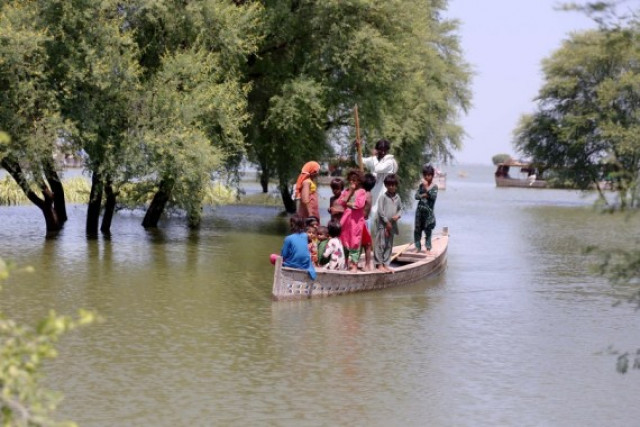Pakistani floods survivors' concern of climate change

- By Xinhua News Agency
- September 5, 2022 12:01 PM
ISLAMABAD -- Shah Aslam, 35, a private college principal in Bahrain area of Pakistan's northwest Swat district, woke up in the middle of the night to the noise of gushing waters in the river near his house to find out that a flashflood had hit the river, making the water level rise with a great speed.
"Everything was normal and we went to bed after having dinner with our families. Our dresses were ready for the next day's work, and kids prepared their bags for school, without knowing that there will be nothing left for us in the morning and the peaceful night will bring the gloomiest sites for us," Aslam told Xinhua.
Aslam and his family lived in a colony of over three dozen houses, the whole of which was washed away by a flash flood at about 3 a.m. on Aug. 26.
The colony was located in the most beautiful area of Bahrain, and a site to behold for tourists who got awestruck by seeing beautiful houses resting on the landscape where pastoral hills overlooked the confluence of two picturesque rivers.
"Despite all misery, we are lucky that we are alive because the next day we heard that some people in the neighboring Kalam area could not get a chance to run for their lives as the flash flood hit them in their sleep," Aslam told Xinhua in his college where he was displaced with his family.
The flood also washed away the main bridge considered to be the lifeline of the valley, cutting the connection of people with the market areas, besides sweeping away hundreds of square feet of land.
"I personally had 38,115 square feet of land, where our ancestors had been living for years. Other families also possessed almost the same area of land, but all went away with the water," Aslam said pointing at the river, adding "This place used to be our home, but now the river has engulfed it."
According to the National Disaster Management Authority of Pakistan (NDMA), 33,046,329 people have been affected by the recent rains and 633,091 of them are currently living in tents.
In a recently released report, the authorities said that 1,290 people have been killed and 12,588 others injured in separate incidents caused by rains and flash floods across the country since the start of monsoon season in mid-June.
The NDMA added that 1,468,019 houses were partially and fully destroyed during the recent monsoon season which also perished 736,459 cattle.
Volunteers from Alkhidmat Foundation Pakistan, a non-government organization working for relief work in the affected areas, narrated horrifying accounts of the disaster, which not only incurred loss of human life and property but also took a toll on the mental health of children as some of them lost their close family members in the catastrophe.
"The catastrophe hit children the most who not only lost their homes and schools but also their childhood to the flood. They are in a state of shock and the situation is not only taking a toll on their mental health but also physical health as they are getting infected by water-borne diseases," Nadeem Ahmad, a volunteer who is assigned to rescuing people through boats in Rajanpur district of Punjab told Xinhua.
In a conversation with Xinhua, Muhammad Abbas, a volunteer from the organization in Sindh said that with over 20 districts under water there is a grave situation in Sindh. In some areas, there is even no dry land to bury the people who died in the flood.
In a recent interaction with the media, Pakistan's Minister for Climate Change Sherry Rehman said that this year the country's south Sindh and southwest Balochistan provinces received 700 percent and 600 percent more rainfall, respectively, as compared to the average during monsoon.
The minister also underlined the disaster that unfolded in the country due to climate change and global warming which made Pakistan's glaciers melt at a rapid pace despite the country's less than 1 percent contribution to greenhouse gas emissions.
The flood victims want developed countries to shoulder the responsibility to help Pakistan mitigate the effects of climate change.
"We are paying the price of the ambitions of the developed world who kept on piling up pollution in the air which resulted in global warming," Aslam told Xinhua.
"Our only fault is that we are living in the foot of glaciers which are melting fast and becoming a time bomb for us and our kids.
After the floods in 2010, several international organizations built two-room houses for the people who lost their homes to the flood, he said, hoping that the world could step forward again and give shelter to the displaced families.
The international support keeps on pouring in for flood victims, but local economic pundits believe that it is far from meeting the need of the losses incurred to the country as the federal government estimated that the recent rains incurred a loss of 10 billion U.S. dollars to the country.
In a press briefing, the country's Finance Minister Miftah Ismail said that the losses are equal to 3 percent of the country's gross domestic product as all major crops were affected by the disaster.
The Pakistani government has allocated over 103 billion Pakistani rupees to provide urgent relief to the flood-affected people.
In addition, the flood has united the Pakistani nation which is not only donating cash to non-government organizations to help flood victims but is also taking trucks loaded with food and other items to relief camps.
"The climate change-triggered disaster has revoked the true spirit of national unity among the people of Pakistan and we are making our best efforts to support the victims in the hour of need," Muhammad Soban, a 17-year-old student loading relief goods collected from friends and family in a truck in Islamabad, told Xinhua.
The flood victims fear that if the world did not adopt the right attitude to save the planet by controlling emissions, and ultimately the developed world may also suffer the impact of the warming globe.
"Despite less than 1 percent emission it's us suffering the wrath of nature, and tomorrow it might be the developed world if it did not take the right step of saving us right now," Aslam said.















